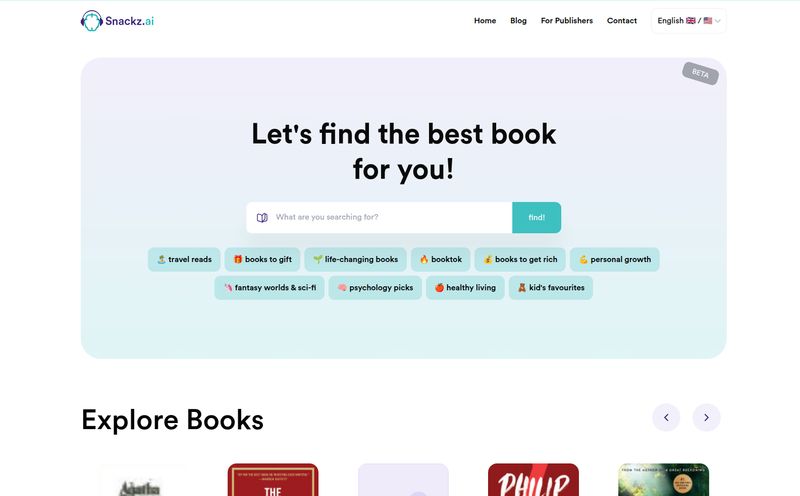Look, I’ve been in the digital marketing and SEO space for years. I’ve seen trends come and go faster than you can say “algorithm update.” But one trend that’s clearly here to stay is AI. It’s in our writing tools, our image generators, and now, it’s aiming to be our personal language tutor. I’ve downloaded more language apps than I care to admit—from the gamified giants to the obscure flashcard decks. Most of them end up forgotten in a folder on my phone.
So when I heard about Luqo AI, I was skeptical but intrigued. Another app promising to make me fluent in Spanish while I wait for my coffee? Sure. But the pitch was a little different. It wasn't just about memorizing words; it was about conversation. It billed itself as a “versatile language assistant.” And honestly, my biggest hurdle with learning a new language has never been vocabulary. It’s the crippling fear of sounding like a fool when I actually try to speak it. So, I decided to give it a spin.

Visit Luqo AI
What is Luqo AI, Really?
Let's get the basics out of the way. Luqo AI isn't just another flashcard app with a fancy interface. At its core, it’s an AI-powered tutor designed to help you learn one of seven languages from the ground up. The whole idea is to simulate real interaction. You can literally “say whatever you want to Luqo,” and it guides you. It’s like having a patient conversation partner in your pocket who doesn’t judge you for mixing up your verb conjugations for the tenth time.
The platform is built around a pretty impressive system of over eleven interactive modes. This is where it starts to get interesting and pull away from the pack. We’re not just talking rote memorization. We’re talking about a comprehensive toolkit that covers everything from exam prep for tests like the TOEFL and IELTS, to practicing specific dialogue, learning new words in context, and even working on idioms and expressions. That last one got my attention—because nothing makes you sound more like a local than casually dropping a well-timed idiom.
The 11+ Practice Modes Are the Real Heartbeat
This is where Luqo AI really plants its flag. The variety of modes is its killer feature, its the thing that sets it apart. It understands that not everyone learns the same way and that your needs change. One day you might be cramming for an exam, and the next you just want to learn how to order a meal without pointing and grunting.
Going Beyond Simple Drills
Some of the standout modes for me were the Dialogue Practice and Shadowing Practice. The Dialogue Practice throws you into simulated real-life scenarios—ordering at a cafe, asking for directions, making small talk. It’s a safe space to fail and try again. The Shadowing Practice is a technique I’m a huge fan of, where you listen to a native speaker and repeat what they say as closely as possible. It’s fantastic for improving your accent and rhythm, but it's rare to find it well-integrated into an app. Luqo seems to have nailed this.
Then you have modes for learning conversation patterns, translating on the fly, and even a general “Learn any topic” mode. It feels less like a rigid curriculum and more like a sandbox for language exploration. You get to steer the ship, which is a big plus in my book.
My Honest Take: The Good, The Bad, and The AI
No tool is perfect, right? After playing around with it, here’s my no-fluff breakdown of where Luqo AI really shines and where it has room to grow.
The Things I Absolutely Loved
The personalization is top-notch. The AI adapts to you, which feels lightyears ahead of the static, one-size-fits-all lesson plans of older apps. It’s the difference between a private tutor and a crowded classroom. The interactive nature keeps you engaged. I found myself losing track of time just trying out different conversation prompts. It’s genuinely fun, which, as we all know, is a massive factor in sticking with anything. It’s a comprehensive system that feels like it was designed by people who actually understand the struggles of language acquisition. It’s not just about what you learn, but how you learn it.
A Few Caveats to Keep in Mind
Okay, let’s be real. First, the language selection is currently limited to seven. If you're hoping to learn Klingon or Swahili, you're out of luck for now. This will likely expand, but it’s a limitation at launch. Second, and this is a big one: its effectiveness hinges entirely on your engagement. This isn't a magic pill. If you don’t put in the time to talk to the AI and use the modes, you won’t see results. You have to be an active participant.
And my biggest philosophical hang-up? There's a potential for learners to become too reliant on the AI. It’s a crutch, a very good one, but at some point, you need to take off the training wheels and talk to an actual, unpredictable human. I think it’s a phenomenal tool for getting you to that point, but we shouldn’t forget the end goal.
What's the Price Tag on This AI Tutor?
Here’s the million-dollar question. What does Luqo AI cost? Well, this is where it gets a bit mysterious. When I tried to find their pricing page, I hit a “Page Not Found” error. This could mean a few things: they're still finalizing the pricing, it’s about to launch, or maybe they’re operating on a beta-access model for now.
My guess? We’ll likely see a freemium model, similar to what's common in the EdTech space. Probably a free version with limited features or daily usage, and then a premium subscription (monthly or yearly) to unlock all 11+ modes and unlimited access. This is just my speculation, but it would make the most sense. I'll definitely update this article as soon as the official pricing is announced.
So, Who Should Download Luqo AI?
I can see a few groups of people getting a ton of value from this:
- The Intermediate Learner on a Plateau: You know the basics, but you can’t seem to break through to fluency. The conversation practice here could be the exact thing you need.
- The Anxious Speaker: If the thought of speaking to a native makes you sweat, practicing with a non-judgmental AI is the perfect low-stakes training ground.
- The Exam Prepper: With dedicated modes for IELTS and TOEFL, this is a no-brainer for students who need targeted practice for these specific, high-stakes tests.
- The Curious Hobbyist: If you just want to learn a language for fun and travel, the engaging, sandbox-style approach is way more motivating than a dusty old textbook.
Frequently Asked Questions about Luqo AI
I've seen a few questions pop up, so let's tackle them head-on.
What languages does Luqo AI support?
As of my review, Luqo AI supports 7 languages. The specific list is on their app store page, but it covers many of the major world languages people want to learn. The company will likely add more over time.
Is Luqo AI good for absolute beginners?
Yes, I believe so. The platform is designed to take you from the ground up. The ability to start with basic vocabulary and simple conversation patterns makes it very approachable for someone starting from zero.
How is Luqo AI different from an app like Duolingo?
Think of it this way: Duolingo is great for building a foundation with vocabulary and sentence structure through gamification. Luqo AI is focused on the next step: applying that knowledge in realistic, flexible conversations. It’s less about matching words and more about producing speech.
Can I practice for specific exams like TOEFL or IELTS?
Absolutely. This is one of its advertised strengths. Luqo AI has dedicated practice modes specifically designed to help you prepare for the speaking and listening sections of these English proficiency exams.
Is my data and privacy secure with Luqo AI?
The company makes a point to highlight its focus on privacy on their homepage. They state that they use secure protocols and do not share conversation data with third parties, which is a reassuring commitment in today's world.
Can I use Luqo AI offline?
Given the AI-powered nature of the app, which likely requires connecting to powerful servers to process language, an offline mode might be limited. You'll probably need an internet connection for most features, especially real-time conversation.
The Final Verdict: A Tutor in Your Pocket?
Luqo AI is an exciting step forward. It's not just an app; it's a tool, a partner, a simulator. It cleverly uses AI to solve one of the biggest pain points in language learning: the lack of safe, accessible speaking practice. It's not going to make you fluent overnight, and it won't replace the experience of a deep conversation with a human being. But it might just be the best tool I've seen for getting you ready for that conversation.
If you've been stuck in a rut with your language learning, or if you're just starting and want a modern approach, I think Luqo AI is absolutely worth a look. It represents a shift from passive learning to active participation, and in my experience, that’s where the real magic happens.
Reference and Sources
- Luqo AI Official Website
- Harnessing the power of AI in language learning and teaching - Cambridge University Press & Assessment



